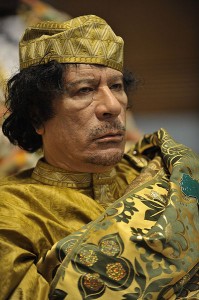I haven’t written much about Libya because I haven’t been sure how I felt about it. I have no doubt that Libya and the world will be better off without Muammar Gaddafi in power, and I was glad to hear the Obama Administration say forthrightly that the man should go. (But where was that resolve during the thwarted Iranian revolution in 2009?)
I’m sympathetic to the idea of a no-fly zone in Libya, to reduce the regime’s firepower in suppressing the uprising. But while Obama has escalated in Afghanistan and declined to follow through on his campaign promise to surrender in Iraq, it’s hard to imagine this administration starting a brand new war. And enforcing a no-fly zone is an act of war, regardless of whether it begins with the bombing of air defenses.
Even if we had a more hawkish President, there are meritorious arguments against establishing a no-fly zone. It might not be enough to bring down the regime — and then where are we? Do we consider sending in ground troops? Other than regime change, under what circumstances could we honorably discontinue the no-fly zone? Do we keep enforcing it for a decade or more, as in Iraq in the 1990s?
In the Wall Street Journal this weekend, former State Department official Eliot Cohen makes a strong case that the Obama administration has mishandled the crisis. An excerpt:
Instead of seizing the opportunity, the administration made cumulative mistakes. It was slow in insisting that Gadhafi had to go—but is now committed to that end, exposing itself to humiliation if he does not. It allowed the Pentagon to publicly disparage military measures, reassuring Gadhafi and dispiriting the rebels, when a discreet and menacing silence would have done far less harm. It called for an international effort when the lesson of decades is that NATO and the United Nations find it impossible to act without American leadership. And when the French government showed strategic initiative and pluck, it undercut a major ally.
The moment has passed. The only question now is whether Gadhafi goes slowly, over months, or not at all. Senior American intelligence officials inconveniently observed the other day in front of Congress that the latter seems the likely outcome. What will happen if they are right?
Good question. This blog is dedicated to the premise that “all that is necessary for evil to triumph is for good people to do nothing,” and on that basis my natural inclination is to intervene in Libya. But while America is by far the most powerful country in the world, it is not omnipotent, and does not have infinite military and economic resources. We should stand against evil, but we can’t prevent every evil.
In the end it’s an academic debate — the chance that this Administration will intervene militarily is close to zero. (Oops!)
Update: Ross Douthat offers another conservative cautionary note on Libya:
If we did supply the rebels, who exactly would be receiving our money and munitions? Libya’s internal politics are opaque, to put it mildly. But here’s one disquieting data point, courtesy of the Center for a New American Security’s : Eastern Libya, the locus of the rebellion, sent more foreign fighters per capita to join the Iraqi insurgency than any other region in the Arab world.
And if the civil war dragged on, what then? Twice in the last two decades, in Iraq and the former Yugoslavia, the United States has helped impose a no-flight zone. In both cases, it was just a stepping-stone to further escalation: bombing campaigns, invasion, occupation and nation-building.
None of this means that an intervention is never the wisest course of action. But the strategic logic needs to be compelling, the threat to our national interest obvious, the case for war airtight.
With Libya, that case has not yet been made.

